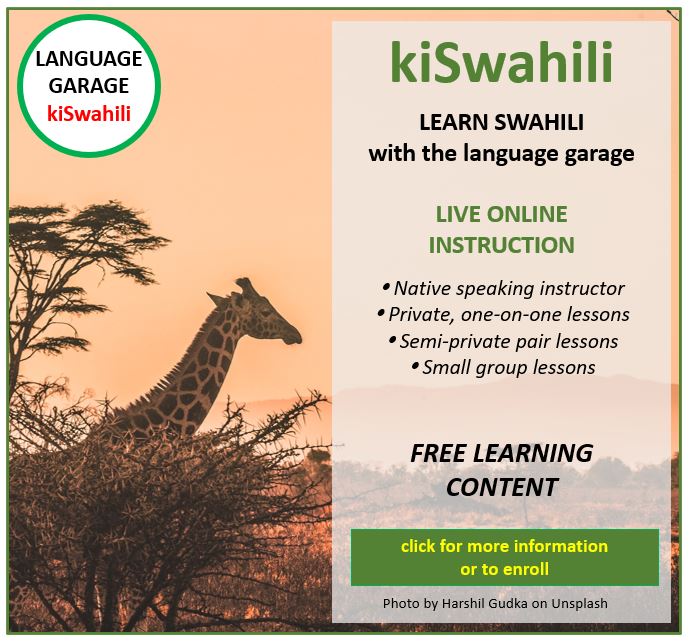Photo Source: Ninastock on Pixabay
Vitabu Books!
In this post we’re going to talk about vocabulary and expressions related to books and reading. If movies are more your thing, check out this post. Let’s start with the basics.
- kitabu/vitabu
book/s - kusoma
to read - Mimi husoma vitabu vingi.
I read a lot of books.
- Je wewe husoma vitabu?
Do you read books? - Napenda kusoma.
I like to read. - Unapenda kusoma?
Do you like to read? - mwandishi
author - mshairi
poet - shairi
poem - Nani mwandishi wa hiki kitabu?
Who’s the author of this book? - kuandika
to write - Yeye huandika vitabu vizuri.
He/She writes great books. - Nani aliandika hiki kitabu?
Who wrote this book? - kichwa
title - Ni nini kichwa cha kitabu?
What’s the title of the book? - jadala
cover - jedwali la yaliyomo
table of contents - ukurasa
page - Iko kwenye ukurasa gani?
What page is it on? - sura
chapter - Kitabu kilichapishwa lini?
When was the book published? - Nani alitafsiri kitabu?
Who translated the book?
Mimi husoma kila usiku. I read every night.
Whether you read a lot or a little, you may want to say:
- Kusoma ndicho kitu ninachokipenda zaidi.
Reading is my favorite hobby. - Kila mara mimi huwa na kitabu.
I always have a book with me. - Mimi husoma kila siku.
I read every day. - Mimi husoma vitabu vingi/ magazeti mengi/ makala mengi/blogu.
I read a lot of books/magazines/articles/blogs. - Mimi husoma kitandani kila usiku.
I read every night in bed. - Mimi husoma mtandaoni/kwenye simu yangu/kwenye simu yangu ya kibao.
I read online/on my phone/on my tablet. - Mimi husoma vitabu vingi.
I read a lot of books. - Sina wakati wa kusoma sana.
I don’t have time to read very much. - Nasoma mara chache/sisomi sana.
I seldom read/I don’t read much. - Kuna duka kubwa la vitabu katika mji wangu.
There’s a great bookstore in my town. - Napenda kusoma kwenye maktaba.
I like to read at the library. - Mimi huazima vitabu vingi kutoka kwa maktaba/kutoka kwa marafiki zangu.
I borrow a lot of books from the library/from my friends. - Nina vitabu vingi.
I have a lot of books. - Mimi hupakua kitabu kipya kila juma.
I download a new book every week.
Unapenda vitabu aina gani? What kind of books do you like?
If you like to read, you probably have a favorite genre.
- Napenda chuku.
I like fiction. - Nasoma riwaya.
I am reading a novel. - Nasoma hadithi fupi.
I am reading short stories. - Nasoma michezo.
I am reading plays. - Nasoma isiyo kuwa na uwongo.
I like non-fiction. - Napendelea fasihi ya klasiki.
I prefer literary classics. - Napenda wasifu.
I like biographies. - Mimi husoma vitabu vya historia.
I read history books. - Mimi husoma vitabu vya mafumbo mengi.
I read a lot of mysteries. - Napenda sayansi chuku.
I love science fiction. - Napenda fantasia.
I love fantasies. - Napenda riwaya za mapenzi.
I like romance novels. - Nasoma mashairi mengi.
I am reading a lot of poetry/poems. - Mimi hununua vitabu vingi vya sanaa.
I buy a lot of art books. - Mimi husoma vitabu vingi vya afya na usawa.
I read a lot of books on health and fitness. - Napendelea vitabu vya biashara na uchumi.
I prefer books on business and economics. - Mimi husoma vitabu kuhusu dini na kiroho.
I read books about religion and spirituality. - Napenda kusoma vitabu kuhusu siasa.
I like to read books about politics. - Napenda kunua vitabu vya upishi.
I love to buy cookbooks. - Nina vitabu vingi vya kusafiri.
I have a lot of travel books. - Napenda vitabu vya katuni / manga.
I love comic books/manga. - Tuko na vitabu vingi vya sanaa ya ujenzi.
We have a lot of architecture books. - Nasoma vitabu vya watoto na watoto wangu.
I read children’s books with my kids. - Vitabu vya kiada ni ghali.
Textbooks are very expensive.
Hiki ni kitabu kizuri. This is a great book.
Hopefully you enjoy what you’re reading. If that’s the case, you may want to say:
- Napenda hiki kitabu.
I love this book. - Kweli, hiki ni kitabu kizuri.
It’s a really good book. - Hiki kitabu ni cha kusisimua na kuvutia.
This book is exciting and fascinating. - Hiki kitabu kimeandikwa vizuri.
This book is beautifully written. - Huu mtungo ni asili/wa kushangaza.
The plot is original/surprising. - Huyu ndiye mhusika nimpendaye.
This is my favorite character. - Siwezi kukiwacha kitabu hiki!
I can’t put this book down! - Inabidi usome hiki kitabu. Nakipendekeza sana.
You have to read this book. I highly recommend it. - Hiki kitabu kina umaarufu.
This book is very popular. - Hiki kitabu ndicho kinauzwa zaidi.
This book is a best seller.
Hiki kitabu kinatisha. This book is terrible!
Of course, not all books are great. If you’re reading something you don’t like, you may want to say:
- Sipendi hiki kitabu.
I don’t like this book. - Hiki kitabu kinatisha.
This book is terrible. - Hiki kitabu kinachosha.
This book is boring. - Maandishi ni mbaya.
The writing is awful. - Mtungo sio asili.
The plot is not original. - Wahusika hawavutii.
The characters are not interesting. - Hii ni tafsiri mbaya.
This is a bad translation. - Siwezi kustahimili kitabu hicho wala mwandishi.
I can’t stand that book or author. - Hata sikumaliza sura ya kwanza.
I didn’t even finish the first chapter. - Kitabu hiki ni kupoteza muda na pesa.
This book is a waste of time and money.
Do you want to learn Swahili?
Check out our other posts on Swahili language, culture, and more. And if you’re looking for convenient and affordable live Swahili lessons with a real teacher, check out The Language Garage Swahili. Our lessons are given online in a virtual classroom, so it doesn’t matter where you live or work. We can come to you. And we have flexible options, with a free trial so that you can decide if there’s a fit. Check us out!





